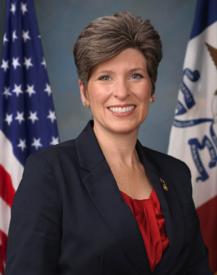
Joni Ernst
U.S. Sens. Joni Ernst (R-IA), Deb Fischer (R-NE), Thom Tillis (R-NC) and Mike Rounds (R-SD) were tapped this week to lead key subcommittees of the Senate Armed Services Committee.
U.S. Sen. John McCain (R-AZ), the chairman of the committee, announced that Ernst will chair the Subcommittee on Emerging Threats and Capabilities, Fischer will chair the Subcommittee on Strategic Forces, Tillis will chair the Subcommittee on Personnel and Rounds will chair the Subcommittee on Cybersecurity.
Ernst said, “As a combat veteran, I look forward to drawing on my experiences to implement policy that strengthens our nation’s defense capabilities, both at home and across the globe.”
In her new post, Ernst will oversee programs and policies related to intelligence, counter-terrorism and homeland security. She will also oversee budget accounts, Department of Defense (DoD) offices, and DoD commands and agencies.
“The threats of ISIS and other radical groups continue to grow, all while our nation faces increasing state threats like an aggressive Russia and Iran,” Ernst said. “We must utilize our international partnerships and allies as we confront these challenges; they too share the responsibility of improving global stability. Additionally, our military must be prepared to address the threats we currently face, as well as any potential future threats.”
Ernst said she would focus on technology advancements needed to upgrade weapons systems, ways to counter increased Russian aggression, and addressing rising threats posed by ISIS in regions like Southeast Asia.
“In addition, I look forward to conducting oversight of leading Department of Defense commands, such as Special Operations Command,” Ernst said. “Each aspect of this subcommittee is of critical importance to our men and women in uniform as well as the safety and security of our nation.”
Fischer will be responsible for oversight of nuclear and strategic forces, non-proliferation programs, space programs, nuclear weapons activities within the Department of Energy, and ballistic missile defense in her post as chair of the Subcommittee on Strategic Forces.
“There is broad bipartisan consensus in Congress that America needs now, more than any other time since the Cold War, a nuclear deterrent that is modern and effective,” Fischer said. “I look forward to ensuring this goal is achieved.”
Tillis will be tasked with oversight of military and DoD civilian personnel policies, military personnel compensation and benefits, military health care, and military nominations in his new post.
“It’s an honor to chair the Senate Armed Services Personnel Subcommittee and serve as a champion for quality of life issues for our brave men and women in uniform, as well as their families,” Tillis said. “During my time as chairman, the Personnel Subcommittee will work on solutions to improve TRICARE services, increase health care coordination between the military and private sector, and improve conditions at military facilities.”
Rounds, meanwhile, said he looked forward to working closely with McCain in the coming weeks to outline an agenda for the committee that will tackle the most pressing national security matters with regard to cybersecurity.
“Of particular concern to me is the Defense Department’s role in responding to an attack on our nation’s civilian critical infrastructure and in deterring bad actors from conducting such an attack in the first place,” Rounds said.
“As recent events have shown, the U.S. is not immune to a cyber-attack from hostile foreign actors. Even more alarming, our adversaries have determined that the reward outweighs the risk of launching a cyber-attack against our nation. It is the newest, most sophisticated form of attack threatening our national security today,” he said.
A cyber attack on critical infrastructure like electric grids, transportation systems and water supplies could cause significant destruction or loss of life.



